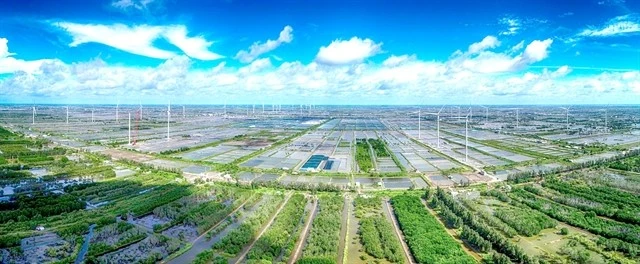
A wind power farm in Bac Lieu province. (Photo: VNA)
It is critical to improve the awareness of enterprises about the carbon market, together with the provision of supports to encourage their market participation, they noted.
Hoang Van Tam from the Ministry of Industry and Trade (MoIT)’s Energy Efficiency and Sustainable Development Department said that the carbon market has been operating in the region for around a decade but remains new to Vietnam. The carbon market is intangible but valuable in terms of investment and business opportunities.
However, if Vietnamese enterprises are not well prepared, the carbon market will pose many challenges, he said.
Green production and emission reduction are unavoidable trends in the context that countries around the world are introducing stringent standards on imported products such as the EU’s Carbon Border Adjustment Mechanism (CBAM).
However, Vietnamese enterprises are seemingly not well-prepared for the carbon market yet, Dang Hong Hanh, managing director of Energy and Environment Consulting Joint Stock Company, said.
She cited statistics that showed 53.16% of companies may have heard about an emissions trading system (ETS) and carbon market, but do not understand the basic operating principles. More than 26% understand the basics, but cannot differentiate ETS from carbon market. Only 1.27% thoroughly understand ETS and the operation of carbon market, their differences as well as their interactions on the carbon exchange.
According to Vu Manh Thang, from the energy board of green energy provider Truong Thanh Vietnam Corporation, companies are still facing a number of difficulties in implementing carbon market-related issues such as legal framework, finance, technology and shortage of talent, market information access, and market and business risks.
Thang said that the focus would be on improving the legal framework and policies through simplifying administrative procedures and enhancing transparency.
It is also necessary to develop financial support mechanisms such as environmental funds and investment funds of international organisations.
Enterprises should invest in technologies for clean production and apply efficient energy management, he added. The development of human resources and promoting international cooperation are also important.
According to Tam, the energy and industry sector aims to reduce by at least 8.2% of greenhouse gas emissions compared to the business as usual (BAU) scenario by 2025, equivalent to 36.2 million tonnes CO2. If there is international support, the sector aims to reduce at least 36.4% of greenhouse gas emissions.
Under the draft project on the foundation and development of the carbon market in Vietnam, the market will be piloted in 2025-28 period, with carbon credits not being sold abroad. The carbon market is expected to officially go operational in Vietnam from 2029.
The carbon market originated from the United Nations Kyoto Protocol on Climate Change 1997 which established a system for trading emissions among countries, leading to the creation of carbon markets.
According to the Carbon Market Institute, there are about 73 carbon schemes, both voluntary and mandatory, worldwide, which altogether cover about 23% of total global greenhouse gas emissions./.
VNA
Source: https://en.vietnamplus.vn/carbon-market-an-opportunity-for-businesses-to-engage-in-green-economy-post307364.vnp
 Digital promotions reshape Vietnam’s e-commerce race
Digital promotions reshape Vietnam’s e-commerce race



